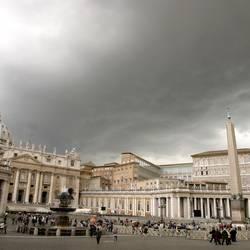|
Pope Francis’ remedies to heal Curial pathologies
By Gianni Valente
Vatican Insider
December 22, 2014
http://vaticaninsider.lastampa.it/en/the-vatican/detail/articolo/francesco-francisco-francis-38203/
 |
| St. Peter’s Square |
An analysis of the speech to the Curia. The Pope does not introduce a new project from the top but the way of mercy that the Church has always recommended in order to cure the 15 ‘diseases’
In his traditional speech to the collaborators of the Roman Curia, a few days before Christmas, Pope Francis avoided customary evaluations of the past year and did not launch programmatic discussions or key words on which to realign the language and initiatives of the Vatican congregations. The Pope spoke to the heads of the Vatican congregations in the Curia about the life of the Curia and its ‘diseases’. His speech expounded a detailed, collective ‘examination of conscience’, recommended to cardinals, bishops and monsignors called to collaborate with him in the Vatican.
The Pope took on the role of spiritual father, educated at the school of St. Ignatius. He did not have any qualms about calling the pathologies, affecting his immediate surroundings, by their name. He did it with lucidity and ‘expertise’ of the object, frustrating once again the stereotype of the Latin-American alien who is not used to the ‘complexities’ of Rome and Europe, with which critics and neo-courtiers attempt to neutralise him. Pope Francis highlighted the root of the curial diseases, as well as providing an ample symptomatology and, above all, he suggested remedies. He started from the rediscovery of the nature of the Church as ‘Mystical Body’ of Christ, according to the consecrated form of Pius XII’s encyclicals ‘Mystici Corporis’.
The ‘Messiah complex’ is mostly responsible for these pathologies among ecclesiastics also in the Curia. This complex often takes over circles and ambitious ecclesiastics, used to putting the teaching about the necessity of grace on the backburner; a teaching already pronounced by Christ to his disciples. Pope Francis said that ‘it must be clear to us all that without Him we can do nothing’. Christmas, said Pope Francis to the officials of the Curia, is a favourable chance to rediscover this dynamic of grace told in the Gospel, because ‘it is also the festival of a light that is not welcomed by the “chosen people” but by the “poor and simple” who awaited the salvation of the Lord.’
The Pope claimed that temptation to self-sufficiency and feeling like ‘masters’ and creators of the presence of the Church in the world ‘are naturally a danger to every Christian and to every curia, community, congregation, parish and ecclesiastical movement and can strike both the individual and the community.’ Even in the Roman Curia, and in the ecclesiastical apparatus linked to it, this clerical presumption engenders pathologies, whose symptomatology Pope Francis listed in ample detail, reaching into the folds of daily life in the Vatican.
In some cases, it is not hard to deduce the names and actual faces of those, whom Pope Francis’ remarks are referred to. For instance when, recalling the case of an ‘elderly priest’, who called journalists to provide private information about his brothers, he spoke of those who ‘relentlessly attempt to multiply powers, and are capable of slandering, defaming and discrediting others, even in newspapers and magazines, to show off their superiority to others.’
In his speech, Francis does not attribute these pathologies to past seasons of the Roman Curia. He does not demonise the time of Vatileaks to compare them to ‘new eras’ of Vatican history. The Pope speaks in the present tense. He does pull himself out. He does not exclude the possibility that even now the Roman Curia might be a place where, serving the Pope, you risk losing your faith to bad-tempered rancour and old and new courtiers. Above all, Francis does not conveniently dress up as the rigorous fustigator or the smug self-accuser. Rather, he suggests methods for healing. It is not a programme, a new pontifical ‘project’ from the top. It is the way of the Gospel and the healing powers of mercy that the Church has always recommended. Starting from the Sacrament of Confession. ‘It will do us good’ said Francis to bishops and cardinals, ‘to approach the Sacrament of Confession, since it hurts us to teach others about the necessity of this sacrament whilst we stay away from it.’
The Pope pinpoints the only antidote to the epidemics of those who ‘turn into masters and feel superior to everyone’, as ‘the grace of recognising ourselves as sinners and saying with our whole heart that “We are unworthy servants; we have only done our duty.”’ The Pope reminds those who fix upon planning and are keen on a self-sufficient Church, which controls its own relevance and mission in the world, about ‘the temptation of enclosing and steering the freedom of the Holy Spirit, which remains greater and more generous than any human plan. The Church shows itself faithful to the Holy Spirit insofar as it does not attempt to regulate and tame it… He is freshness, fantasy, originality.’
Even the unity and communion among collaborators of the Pope cannot be achieved through an effort of self-conscience, but flourishes in the rediscovery that only ‘the living relationship with God feeds and strengthens also our communion with others, whereby the more intimately united with God we are, the more united among us we become, because God’s Spirit unites and the devil’s spirit divides.’ Pope Francis recommends that everyone repeats often St. Thomas More’s prayer to preserve self-irony and a sense of limitations: ‘Grant me, O Lord, good digestion, and also something to digest. Grant me a healthy body, and the necessary good humour to maintain it… Give me a soul that knows not boredom, grumblings, sighs and laments, nor excess of stress, because of that obstructing thing called “I”.’
|
